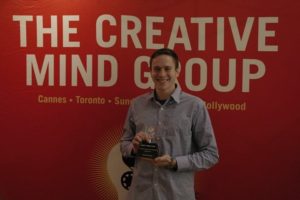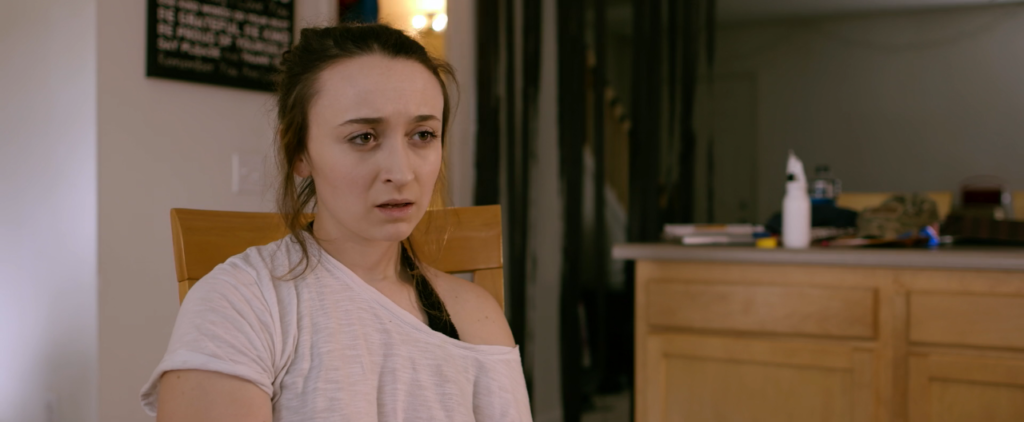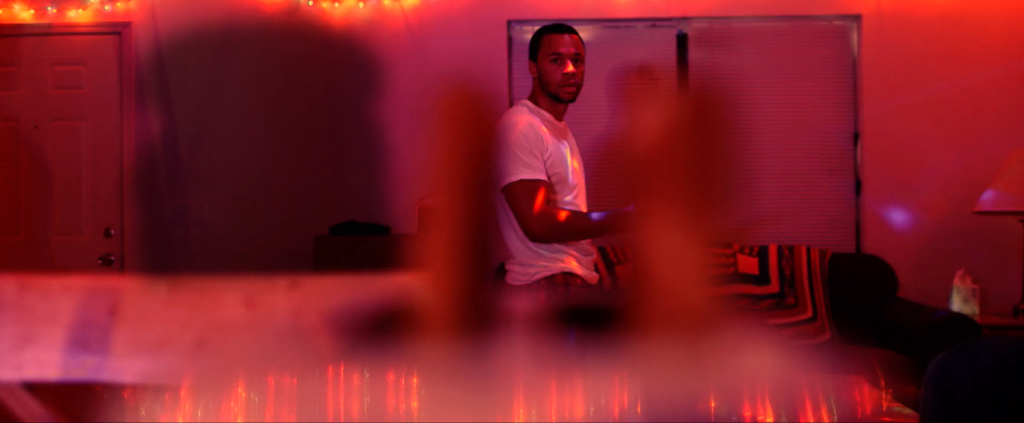Showcase Filmmaker Spotlight: Sam Thompson
Showcase Filmmaker Spotlight: Sam Thompson
By Travis Trew, Programming Associate

Sam Thompson hails from Marlton, New Jersey but didn’t start cutting his filmmaking teeth until his sophomore year at West Virginia University. After joining the school’s film club, Thompson discovered his passion for writing and directing movies and hasn’t stopped making films since. His short Toast is an unconventional and surprisingly funny take on a haunted house story, following a bumbling couple (Olivia Loy and TJ Suarez) who are ill-equipped to deal with the eerie events happening all around them (including the presence of a malevolent toaster).
PFS: Did you come to filmmaking as someone who watched a lot of films?
ST: I’d always kind of liked movies but I wasn’t a film buff. But once I started studying film, I found myself renting movies, getting a Netflix account, and watching every movie I possibly could to use as a study tool. And it’s weird because, again, I never really considered myself a movie buff. I never thought that was something I’d be interested in. But once I started to figure it out, and learn about the process behind everything, I fell in love with it. I fell in love with everything film had to offer.

PFS: How did Toast come about?
ST: We made it in October of last year. And that was the fifth short I’d made at that point. It was just my friends and I. My cinematographer Mikey D’Amico and I were just sitting around talking, seeing if we could come up with a good idea for a goofy, funny Halloween short. We had just finished watching a bunch of Edgar Wright movies—you know, Shaun of the Dead, Hot Fuzz—and we really looked around and tried to find in the deepest, darkest corners of YouTube if anyone was doing Edgar Wright-inspired comedy. And no one really was. And I think visual comedy the way he does it is really underrepresented. We studied as much of him as we could—especially Hot Fuzz—and it took us about four or five weeks to really iron out a script and figure out exactly what elements we were going to take from him and how we were going to make it ridiculous but not over-the-top ridiculous. Which is kind of stupid to say because it’s about a haunted toaster. But we just wanted to incorporate a lot of Edgar Wright-inspired themes from everything he’s done and just have fun with it.
PFS: What is it about Edgar Wright’s style that appeals to you?
ST: It’s not lazy. What I mean by that is you’ll see a Will Ferrell movie or you’ll see a movie like This Is the End and they’re just all tripod shots and basic coverage. And I feel like anyone can do that. It’s easier, it’s lazy, and you’ve seen it 100 times before. But with Edgar Wright, he just kind of goes above and beyond in his composition of shots and the way his characters interact with each other, and the way they interact with the frame. He shoots almost everything on telephoto and has a lot of Michael Bay-inspired things. He uses the movement of the camera to make you laugh and draw you into the story instead of just relying on the dialogue. Which is something that really appeals to me because I like going above and beyond and doing things that people don’t see that often. I just think there aren’t enough people going above and beyond and doing more than just that basic coverage.
PFS: Has it been important for you to find a team who can help you execute your vision?
ST: Mikey D’Amico—he’s the cinematographer and editor for this—is only 18 years old. If it weren’t for him, none of the stuff I’ve been doing, before Toast or after, would be possible. This kid is an absolute phenom. Remember his name. He’s going to be one of the best to ever do it. And without him none of this would’ve been possible, Toast wouldn’t be nearly as good. We put about 80-90 hours into post-production, and he was so patient. He never took anything off the table. Nothing was too stupid to try. We would always try some stupid stuff at least once or twice to see if it worked. It destroys my mind how young and talented this kid is. It’s absolutely insane.
PFS: Why the toaster?
ST: One of the things that I like to do when I’m coming up with an idea for a short is think of what kinds of shots would be cool. I was just sitting out on my deck one day looking out at the view that I have down at school. For some reason—I don’t know why—I just thought of a toaster that was popping up. And then of pulling the focus to someone who’s standing in the distance. It’s the very last shot of the entire short. And I don’t know why that popped into my head but it did. I figured, “Oh it’s October, let’s see if we can make something that’s scary and goofy about a toaster.” I brought the idea to Mikey and he said, “Yeah, it works for what we’d like to do.” So we started hashing out some ideas and wrote some stuff down. But it really all started from just that one shot idea.

PFS: The film has a pretty unconventional mix of comedy and horror elements. Was it hard to find that balance?
ST: I actually loved it. I like to shoot stuff as a comedy when it’s actually a horror film, because I feel like the way you see it is a kind of mask on what it really is. I have struggled with mental illness, like anxiety and depression, for my entire life, and I feel like my art is kind of an extension of that. Everyone I’ve met who has the same issues, they kind of put a mask on themselves to cover up what’s really happening. So I thought it would be a cool little mask to put over the horror of what’s really happening in the film. The toaster—at least to me—is kind of representative of people’s demons. You never really know what’s going to come up or what’s going to pop up and ruin your day, or week, or month, or whatever. It can be something as stupid as, for example, a toaster. Something little like that. I like to throw in those little motifs and use a visual comedy mask to hide and play around with the fact that underneath, if you look closely enough, it’s actually a scary story and there are people dealing with stuff that they don’t want to face.
PFS: The film uses sound effects in some interesting ways. How did you go about finding those?
ST: We just wanted to do something that added to the ambience of being weird. Again, this is something about a haunted toaster, so obviously normalcy didn’t play into it. We looked through hundreds of sound effects for hours and days to see if we could find something weird. We really just wanted weird. We just went out of our way to find the weirdest, dumbest sound effects that we could that would fit each and every movement, action, and transition. So that was probably, in my opinion, the most fun part of this—trying to find these sound effects that would fit the narrative of a haunted toaster.
PFS: Are you guys working on any more projects?
ST: I have one film in post-production right now, called Leave. It’s about domestic abuse and domestic violence. That’s something that I’ve unfortunately had to deal with in my life, with family and stuff like that. So I really wanted to make—not a PSA, exactly—but a social narrative film that points out this insanely huge issue with society right now. I really just wanted to hold up a mirror to some people in our society and say, “This is something that’s going on. Here are some of the things you want to look out for.” Domestic violence thrives in silence, so we really want to focus on trying to break that silence. It’s something that not a lot of people talk about, but it’s something that people know goes on and is really pretty prevalent in our society.
PFS: Was it tough to transition from doing a fun genre film to doing something so serious?
ST: I’ve always liked drama and liked writing for drama. I just like putting that comedic mask over it to make it seem not quite as heavy. But it really wasn’t that difficult of a transition. It was definitely a lot more emotionally draining, but it was a lot more rewarding, and I feel like this is something that definitely will give some people a voice, or at the very least give one person a voice to speak up and get help if they need it.
Toast will screen on Thursday, July 13th at the Prince Theater’s Black Box as part of Philly Film Showcase, an exhibition supporting new work by talented, up-and-coming local filmmakers.